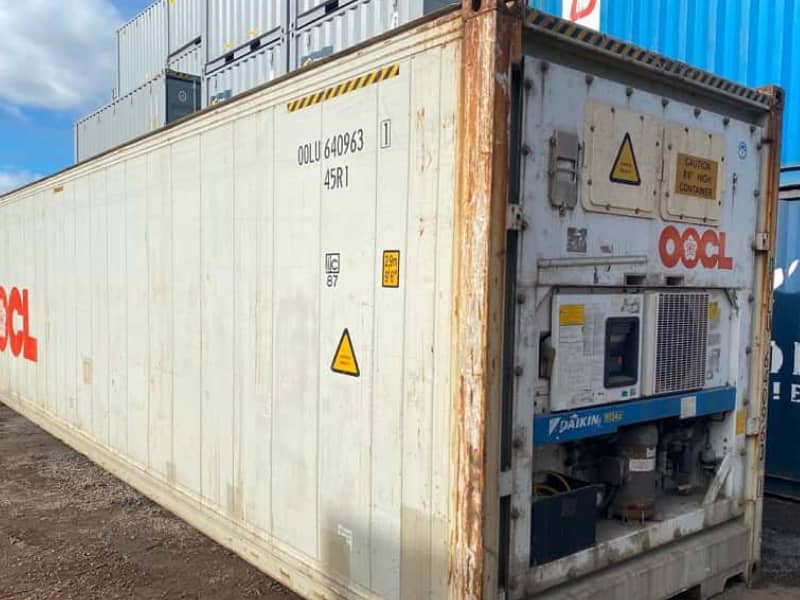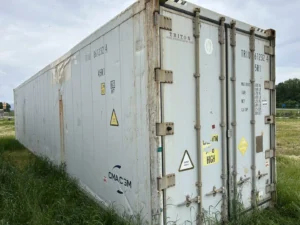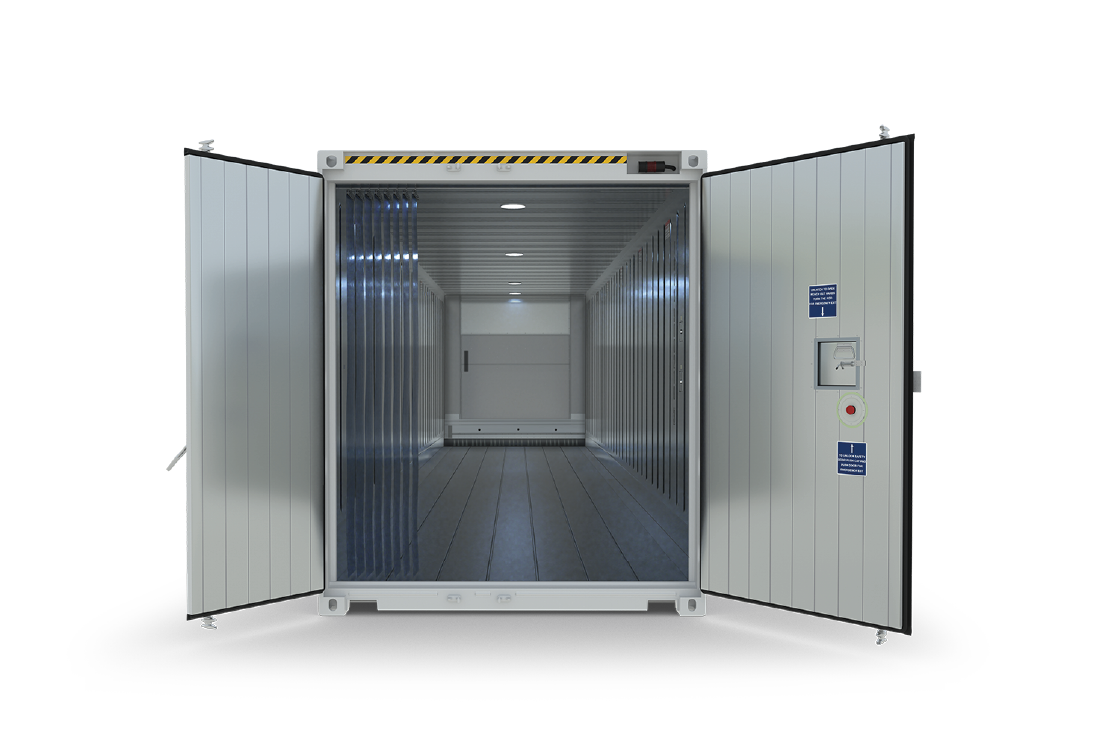All About Cold Storage Space Containers: Important Insights for Your Storage Space Needs
Freezer containers play an important duty in the preservation of subject to spoiling goods. They can be found in various types, consisting of cooled and shielded units, each created for specific storage needs. Understanding the advantages and vital features of these containers is crucial for services intending to optimize their operations. As the need for reliable storage services expands, discovering the different options offered can bring about informed decisions that affect both earnings and sustainability. What elements should one think about when choosing the appropriate container?
Kinds Of Freezer Containers
Freezer containers can be found in numerous types, each made to meet details temperature control requirements. Amongst the most usual kinds are chilled containers, which maintain temperature levels between 0 ° C to 10 ° C, making them appropriate for subject to spoiling items like fruits, veggies, and milk products. An additional type is the deep fridge freezer container, which operates at temperatures listed below -18 ° C, ideal for lasting storage of icy items such as meats and fish and shellfish.
Protected containers provide temperature level stability without energetic cooling, making them beneficial for short-term transportation of temperature-sensitive products. Furthermore, there are mobile cold store systems, which supply versatility in areas and are typically utilized in occasions or seasonal procedures. Lastly, blast refrigerators rapidly lower the temperature of hot foods, making certain security and quality. Each type offers an unique purpose in various industries, from food service to drugs, highlighting the importance of picking the right container for certain storage space needs.

Advantages of Making Use Of Cold Storage Solutions

Additionally, cold store services extend the rack life of things, lowering waste and raising productivity for organizations. By effectively managing inventory with correct temperature control, companies can maximize their supply chains and improve functional effectiveness.
Additionally, freezer facilities enable flexible storage space choices, suiting different volume requirements and seasonal fluctuations in need (used 40ft refrigerated shipping containers). This adaptability aids companies react rapidly to market changes
Utilizing cool storage services can assure compliance with health and wellness and safety and security regulations, protecting both customers and businesses. On the whole, the tactical use of cold store boosts product administration while advertising sustainability and financial viability.
Key Functions to Try To Find in Cold Store Containers
When selecting freezer containers, a number of crucial attributes benefit cautious consideration to protect peak efficiency and dependability. Temperature control capabilities are vital; containers must keep regular temperature levels appropriate for certain products. Insulation high quality also plays a significant role, as superior insulation reduces power intake and improves temperature stability.
Next off, simplicity of gain access to and loading is vital; containers ought to offer straightforward layouts for effective handling and organization. Durability is an additional crucial element; weather-resistant materials assure durability and protect materials versus environmental variables.
Furthermore, movement features, such as integrated wheels or lifting factors, facilitate transport, while personalized layouts enable customized storage space services.
Lastly, checking systems, including temperature level alarms and remote monitoring, offer real-time updates, making sure that problems continue to be suitable. By concentrating on these features, individuals can pick cold store containers that fulfill their operational demands effectively.
Choosing the Right Cold Storage Space Container for Your Needs
Selecting the appropriate cold store container calls for a thoughtful assessment of particular requirements and operational demands. Elements such as the sort of items being stored, temperature sensitivity, and quantity must be focused on. Subject to spoiling food things might necessitate containers with stringent temperature controls, while pharmaceuticals may require precise conditions to preserve efficiency.
In addition, possible customers should think about the container's size and movement. A larger system may be required for bulk storage, while smaller, portable choices might be optimal for short-term or on-site requirements. Insulation quality and energy efficiency are likewise essential, as these will certainly affect functional costs and temperature stability.
Conformity with market policies and requirements is vital, particularly in markets like food and health care. By very carefully reviewing these facets, individuals can choose a freezer container that efficiently meets their unique requirements and assurances optimum storage conditions.
Ideal Practices for Preserving Cold Store Issues
Preserving optimal chilly storage space problems is crucial for preserving the top quality and security of temperature-sensitive items. On a regular basis keeping an eye on temperature and moisture levels is important; utilizing reliable digital thermometers and hygrometers can supply precise readings. Correct insulation of chilly storage containers helps decrease temperature variations and energy loss.
Implementing a first-in, first-out (FIFO) system ensures that older inventory is utilized before newer supply, decreasing waste (used 40ft refrigerated shipping containers). In addition, keeping an organized layout within the storage space permits for far better air movement and minimizes the danger of cross-contamination
Routine maintenance checks on devices, such as seals and compressors, are necessary to prevent malfunctions. Team training on best practices for loading and unloading products aids maintain temperature level integrity. Keeping doors shut as much as feasible limits warm exchange, ensuring that the cold storage space environment continues to be stable and reliable in protecting valuable items.
Cost Factors To Consider for Freezer Solutions
When examining cold store remedies, it is crucial to consider the initial financial investment costs along with continuous functional costs. A complete break down of these prices can expose substantial long-lasting financial savings capacity for organizations. Comprehending these economic aspects assists stakeholders make informed decisions concerning their freezer demands.

Initial Investment Prices
The financial landscape of cold store containers provides numerous initial financial investment prices that companies have to think about. These prices generally consist of the acquisition or the original source rental price of the containers, which can vary based upon type, insulation, and size high quality. In addition, expenses connected to retrofitting existing frameworks to suit cold store needs to be factored in, specifically if specialized equipment is required. Setup expenses, consisting of electric job and refrigeration systems, likewise add to the general first financial investment. Businesses ought to not ignore transport prices for supplying containers to their wanted area. Finally, potential customization options, such as shelving or temperature monitoring systems, can even more affect the preliminary monetary outlay. Cautious budgeting for these aspects is crucial for successful freezer execution.
Functional Costs Malfunction
Operational expenses for cool storage space options encompass several critical price factors to consider that services should navigate. Trick aspects include power expenses, which can be considerable due to the demand to preserve reduced temperature levels. Maintenance expenditures are likewise significant, as normal servicing is necessary to assure devices runs effectively and remains certified with health and safety and security requirements. In addition, labor expenses might emerge from the requirement for specialized staff to take care of and keep an eye on the storage environment. Insurance policy expenses are one more factor to consider, as business have to safeguard their financial investments versus potential losses. Any type of possible regulatory conformity expenses need to be factored in, as organizations may need to invest in systems that adhere to food security and ecological laws. Understanding these costs is critical for effective budgeting.
Long-Term Savings Potential
Buying freezer remedies offers substantial long-term cost savings capacity, transforming preliminary expenditures into monetary effectiveness gradually. By decreasing spoilage and waste, businesses can boost their profit margins considerably. Advanced insulation and energy-efficient systems reduce utility costs, which accumulate over the lifespan of the equipment. Cool storage space containers typically need less constant maintenance compared to typical refrigeration techniques, leading to lower repair expenditures. The capability to store items for prolonged periods without endangering high quality allows organizations to profit from market fluctuations, maximizing profits. Additionally, the scalability of cool storage remedies allows firms to adjust to altering needs without incurring too much expenses. On the whole, these aspects contribute to an engaging case for cold store as a cost-effective investment strategy.
Often Asked Questions
The Length Of Time Can Food Be Kept in Freezer Containers?
The duration food can be kept in cool storage containers differs by kind. Generally, disposable things last from days to weeks, while frozen foods can continue to be safe for months, depending upon correct temperature and storage problems.
Are Cold Store Containers Energy-Efficient?
The energy effectiveness of freezer containers varies based upon layout and insulation quality. Modern systems frequently use sophisticated innovation to reduce power consumption, ultimately adding to lowered operational costs and environmental impact in long-lasting use.
Can Cold Store Containers Be Custom-made for Details Demands?
Freezer containers can certainly be customized to satisfy particular requirements. Adjustments may include temperature controls, size adjustments, and additional features, allowing individuals to tailor options successfully for numerous storage space demands and operational preferences.
What Are the Usual Dimensions of Cold Storage Space Containers?
Cold store containers commonly can be found in typical dimensions such as 10, 20, and 40 feet. These measurements fit various storage space needs, making sure versatility for companies needing temperature-controlled settings for pop over to this site subject to spoiling products or sensitive products.
Do Cold Storage Containers Require Unique Licenses for Use?
Freezer containers commonly require unique licenses for use, relying on local regulations and planned applications. Authorities may mandate authorizations to assure safety and security requirements, ecological conformity, and correct functional practices are preserved during their application.
Cold storage containers come in different types, each developed to satisfy specific temperature control needs. Furthermore, cold storage facilities enable for adaptable storage space alternatives, suiting various volume needs and seasonal variations in demand. Choosing the best chilly storage space container needs a thoughtful assessment of particular needs and functional demands. The economic landscape of cool storage space containers offers different preliminary investment costs that organizations Check Out Your URL need to think about. Cold storage containers can indeed be personalized to fulfill particular needs.